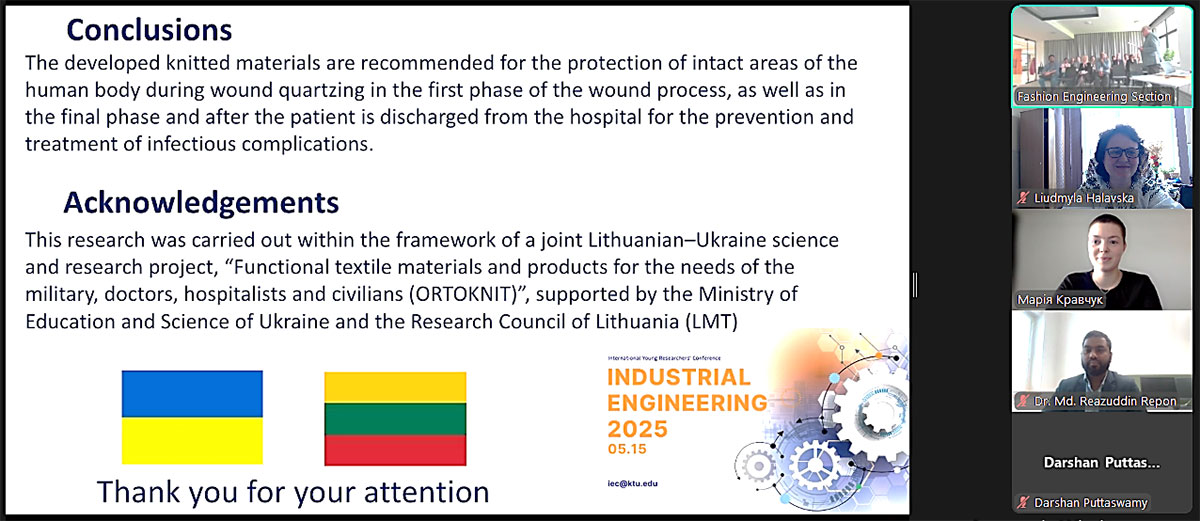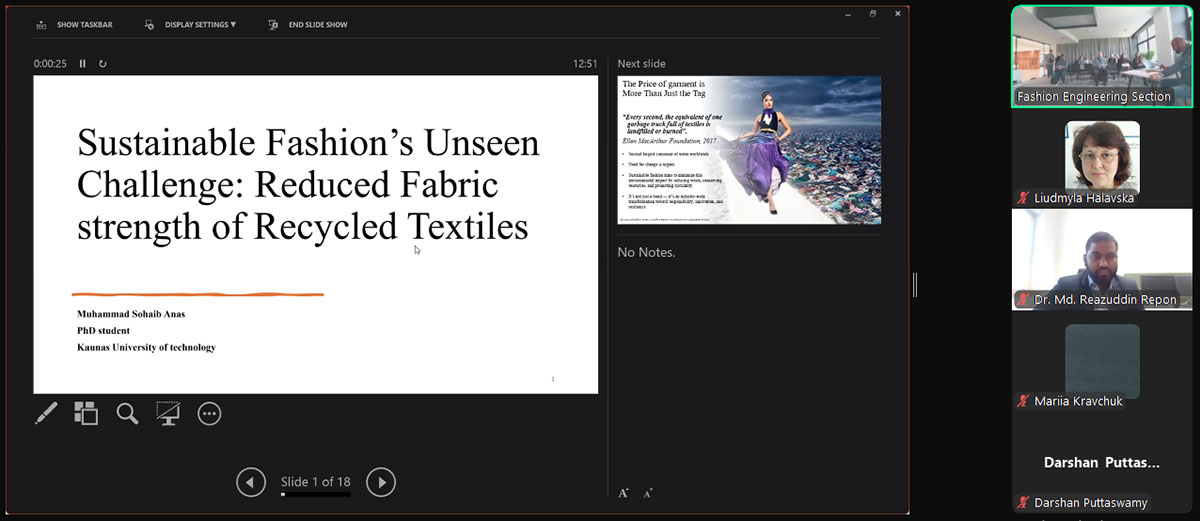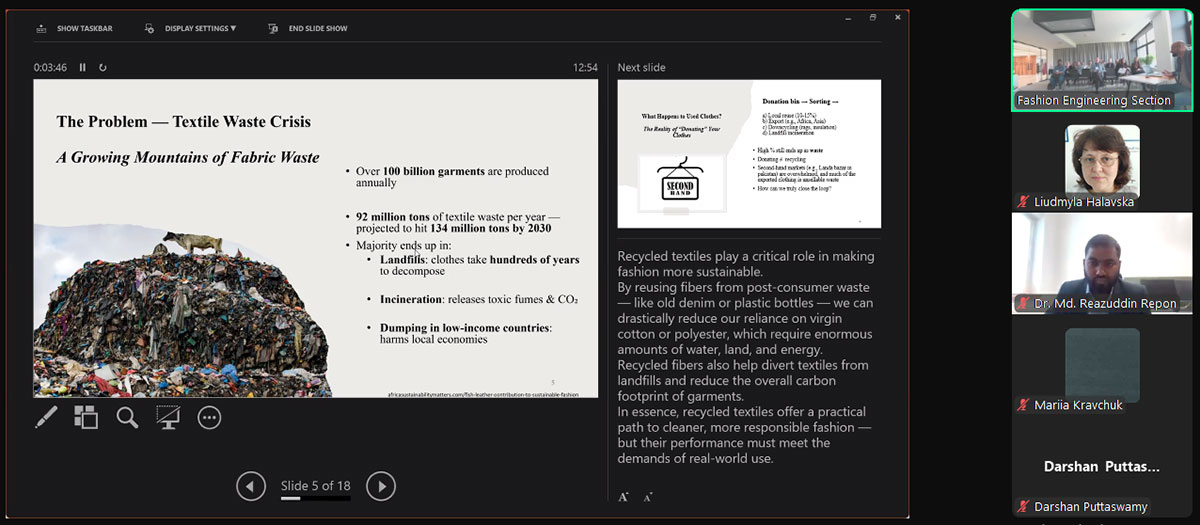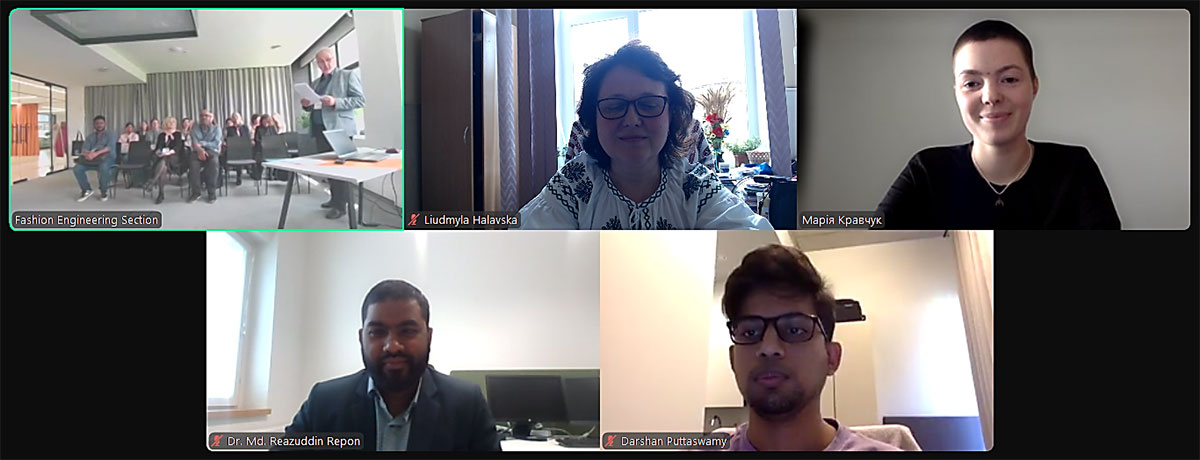As a result of the implementation of the research project “Functional Textile Materials and Products for the Needs of the Military, Medical Staff, Hospitallers, and Civilian Population (ORTOKNIT),” conducted within the framework of Ukrainian-Lithuanian international scientific collaboration, on May 15, 2025, researchers from the Departments of Fashion Technology and Fashion and Style at the Faculty of Arts and Fashion participated in the 12th International Young Researchers’ Conference on “Industrial Engineering 2025” ( https://iec.ktu.edu/#Program ). They took part in the thematic session “Fashion Engineering – Technologies of the Future,” which was held in a hybrid format. The session “Fashion Engineering – Technologies of the Future” was dedicated to a comprehensive analysis of the fashion industry as an inclusive global platform that brings together industrial professionals, scientists, and young researchers exploring innovative textile and clothing technologies. The interdisciplinary nature of the session provided a holistic perspective on design and manufacturing processes, emphasizing the implementation of digital technologies and principles of sustainable development.
Second-year PhD student Maria KRAVCHUK presented research findings by delivering an online report titled “Development of Compression Knitwear with UV Protection Properties”. She represented both the doctoral student community enrolled in the Specialty G15 Consumer Industry Technologies and our University as a whole with dignity and professionalism.


Among the presentations that left a notable impression, Mohammad Reazuddin Repon (Aalto University, Finland) delivered a report focusing on the enhancement of the antimicrobial properties of cotton fabrics through the application of natural biocomponent extracts. In his presentation, the researcher shared experimental results that demonstrated the effectiveness of such extracts in functional textile treatment. Special attention was given to the potential integration of this technology into the production of protective clothing, particularly within the medical sector. This study makes a significant contribution to the scientific understanding of the creation of functional textiles, highlighting the promising prospects of utilizing natural substances to improve the safety and operational reliability of textile products.

Within the section, an engaging study was also presented, focusing on the integration of problem-based learning into the educational process of modeling the performance properties of fashion products. Urtė Marija Česonienė (Kaunas University of Technology, Lithuania) provided an in-depth analysis of the effectiveness of this teaching approach, which centers around solving real-world industrial problems as a means of fostering critical thinking in students and deepening their understanding of textile material properties. Particular emphasis was placed on the methodology of measuring bending stiffness, which enables the assessment of functional garment characteristics and supports the development of students’ ability to adapt design solutions to meet the practical demands of product use.
One of the less-studied yet highly relevant sustainability challenges in the fashion industry was addressed in the presentation by Muhammad Sohaib Anas (Kaunas University of Technology, Lithuania), which focused on the release of microfibers from recycled textile materials during washing processes. The speaker provided a thorough analysis of the mechanisms underlying this phenomenon, highlighting the fact that even environmentally oriented materials pose risks of microplastic pollution in the environment. The empirical data presented underscored the scale of microfiber release and its potential negative impact on ecosystems. Additionally, possible strategies to mitigate this effect were examined, emphasizing their importance as a crucial step toward implementing more ecologically responsible textile production practices.


At the conclusion of the session, students from Kaunas University of Technology presented posters prepared based on their research, highlighting issues related to textile waste recycling, the influence of yarn parameters on microfiber release, and new approaches to modeling the performance properties of clothing.
The final stage of the session featured a poster presentation showcasing the research conducted by Kaunas University of Technology students. The posters covered a broad range of pertinent topics, including textile waste recycling, the impact of the physical and mechanical parameters of yarn on microfiber release intensity, and innovative strategies for modeling the functional characteristics of garments.

Participation in the conference was a significant event for the exchange of experience and the expansion of international scientific collaboration in the fields of textile technologies and design.
02.06.2025